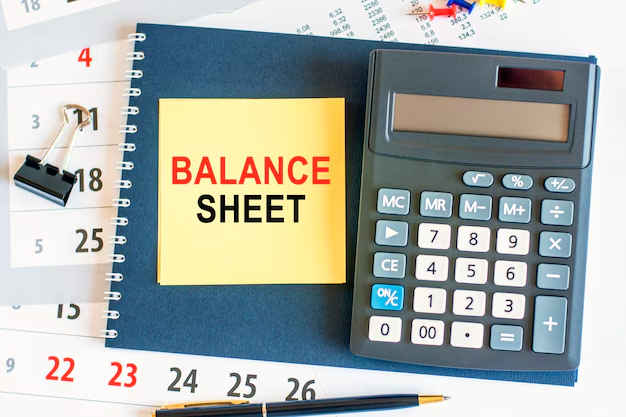You are having trouble locating your net income? You need not worry! The estimation of net income is one of the most relevant operations in the sphere of finance and accounting. It presents a clear understanding of the profitability of a firm, as well as offering insightful information to the management and the investors. Nevertheless, it will linger in your head, how to calculate net income from balance sheet, through the formula of net income, and talking about the equation of net income. As a student, a neophyte investor, or a person undertaking a finance career, it is worth learning how to calculate net income, as this would help determine the financial health of a firm.
Key Takeaways
- Net Income is an indicator that determines the profitability of a company, taking the total revenue and deducting all the expenses.
- You must have revenue, expenses, and retained earnings in order to compute net income based on the balance sheet.
- The net income formula is very necessary to determine the level of profit or the amount of loss that a company has incurred.
- Net income of retained earnings could be calculated by employing the retained earnings formula.
- The net income equation separates the revenue and expenditure into factors that have a direct effect on the profitability of a company.
What Does Net Income Mean?

The net income is the amount that remains as profit after subtracting all the expenses, taxes, and costs incurred by the company in obtaining total revenue. It is the money that a firm decides to spend according to all the payouts that it has received. It is occasionally called a net profit or net earnings. The figure is among the most essential parameters of the financial performance of a company.
Significance of Net Income
- Profitability: Net income is the level of profitability when all costs are accounted for. You can be aware of what you have and how much you can invest to get more revenue.
- Investment Decisions: The net income is used by individual investors in determining whether to invest in a company or not. Why? 63% of Americans live paycheck to paycheck because they don’t understand their net income clearly. Understanding this phenomenon brings a sense of investment to them.
- Business Planning: When a company has net income, it applies to the decision-making process of future investments and dividends, and strategies to be adopted. Benefit? People who track their net income and expenses are 78% more likely to meet their savings goals.
Important Elements of a Balance Sheet
Before we look at how we are going to calculate net income based on a balance sheet, we will first learn the key components of a balance sheet. A balance sheet breaks down into two primary parts- assets and liabilities. These segments will aid in deciding how to derive net income, since they also contribute to the realization of the financial position of the company.
- Assets: These are things that the company owns, such as cash, property, inventory, and accounts receivable.
- Current Assets include cash, accounts receivable, and inventory.
- Non-current Assets are long-term investments, property, and intangible assets.
- Liabilities: These are the debts and obligations that the company owes to others.
- Current Liabilities are short-term loans/debts that need to be paid within a year.
- Non-current Liabilities are long-term loans/debts, such as bonds or loans with a maturity period longer than a year.
- Owner’s Equity: This is the residual interest in the assets after deducting liabilities. It includes common stock, retained earnings, and other equity items.
How to Calculate Net Income from Balance Sheet?
In order to find net income using a balance sheet, it is vital that you concentrate on the revenues of the company, expenses, and any other information that can provide you with the calculations in order to determine the profitability of the company. However, the net income cannot be obtained simply from the balance sheet. But the balance sheet has important elements that aid in calculating the income.
Calculation of net income can be undertaken as follows:
1. Gather Revenue and Expense Information
The initial step is to collect revenue and expense data. These details are available in the income statement as opposed to in the balance sheet. Nevertheless, the particular information about assets and liabilities, which might have an influence on the net income, could be found in the balance sheet.
- Revenue (or sales) includes the total amount of money earned from selling goods or services.
- Cost of Goods Sold (COGS) is the cost of producing goods or services.
- Operating Expenses include salaries, rent, utilities, and other operating costs.
- Interest expenses are costs related to borrowing money.
- Taxes are the amount the company has to pay to the government.
2. Use the Net Income Formula
To calculate net income, we can use the net income formula:
Net Income=Revenue−COGS−Operating Expenses−Interest Expenses−Taxes
This formula will give you the net earnings, or the final profit or loss for the company. However, it’s important to note that revenue and expenses can be stated in the income statement, not the balance sheet.
3. Utilize the Balance Sheet for Additional Insights
Though the balance sheet does not even compute the net income, it can still be of good use to guide you in determining the financial health of a company. For example:
- Retained Earnings: Retained earnings are an amount that is recorded under the equity portion of the balance sheet and indicate how much of the net earnings that a company has withheld and not paid as dividends.
3. Convert Non-Cash Items
Examples of non-cash items are depreciation and amortization that decrease the amount of taxes paid on income but do not require actual cash payments. These are also to be considered as being reflected in net income.
Trying to make the numbers work? Visit the net income zone and find various ways to calculate net income without any hassle..
How to Find Net Income from Retained Earnings?
A useful way to find net income from the balance sheet is by looking at retained earnings. Retained earnings show the portion of net income that a company has kept in the business rather than paying out as dividends.
The formula for retained earnings is:
Retained Earnings=Beginning Retained Earnings+Net Income−Dividends
If you know the retained earnings from the previous period and the dividends paid, you can calculate net income using the equation:
Net Income=Retained Earnings−Beginning Retained Earnings+Dividends
This method works best for companies that use a balance sheet to track their earnings over time and pay dividends to their shareholders.
The Net Income Equation Explained
The net income refers to how net income is calculated based on the business’s revenue and expenses. It can also include additional factors like taxes and interest that affect profitability.
The net income equation is a variation of the basic formula we discussed earlier, which can be represented as:
Net Income=Revenue−(Operating Expenses+Non-Operating Expenses)
In this equation:
- Revenue is the total income earned by the company.
- Operating Expenses include costs that are directly related to the core business operations.
- Non-Operating Expenses are levies not directly related to the primary business activities, such as interest expenses and taxes.
Understanding this equation helps break down how a company’s total revenue is reduced by various expenses to determine the net income or net earnings figure. Even if you invest $100 or less, you can easily calculate your net income to determine your financial positioning.
How to Calculate Net Income in Other Scenarios
Besides the utilization of the balance sheet, there are some other methods to determine net income. All the methods might involve varying financial statements, although they all tend towards measuring the profitability of an organization.
- Through the Income Statement: Net income is directly calculated in this manner. The income statement gives the aggregate revenues and expenditures and directly computes the net income.
- Using Cash Statements: As can be seen using the cash flow statement, a rough estimate of net income is possible through the cash inflows as well as the outflows.
Conclusion
The need to comprehend how to calculate net income from balance sheet is also necessary for anyone interested in studying the financial health of a company. Ranging from a business owner to an investor or a student, this apprehension of how the net income is calculated and how you can access the information that is required will be beneficial in further decision-making. Conveniently, you now know how to compute net income using the balance sheet, which comes in handy when gauging the profitability and financial standing of a company.
Think your paycheck tells the whole story? Think again. Head over to the Net Income Zone and uncover smarter ways to understand where you really stand.
FAQs
1. What Influence Does Net Income Have on the Stock Price of a Company?
Net income is an essential factor that investors are concerned with when determining the performance of a company. A firm having more net income is usually considered more profitable, which can reflect positively on its stock price. On the other hand, weaker or negative net income may be an indication of financial distress, and this should result in a drop in stock price.
2. Is Negative Net Income Possible?
The net income can be negative, yes. This is termed a net loss. The net loss can be said to arise when the sum of expenses in an organization exceeds the income in a certain period. This may occur due to different factors, including falling sales, high operating expenses, or unforeseen one-time costs.
3. What Is the Net Income as Opposed to Gross Income?
Gross income is the amount of money earned by a company, not considering any expenses, taxes, or costs. Conversely, net income is the actual profit obtained after taking away the operating expenses, such as taxes and other costs of operating the company, to reach the gross income. The net income portrays a better image of the profitability of the company.
4. What Is the Relationship Between Net Income and Free Cash Flow?
Net income summarizes the profitability of a business after all costs, whereas the free cash flow is used to show the amount of cash a business generates after considering the capital expenditures. Though neither metric is more crucial than the other in financial review, the free cash flow gives a better representation of the capabilities a company has when it comes to generating cash that it may reinvest or pay out to its investors.
5. Does Ebitda = Net Income?
No, net income and EBITDA ( Earnings Before Interest, Taxes, Depreciation, and Amortization) are not the same. The net income does not leave any expenses behind, such as interests, taxes, and non-cash expenses, such as depreciation expenses. EBITDA, however, does not consider these costs and instead provides a pure view of profitability through the operating activities of the company.
Michael Adams is a professional finance writer with a focus on tax education, budgeting, and personal finance. His goal is to make income tax topics clear and practical for individuals and entrepreneurs.

